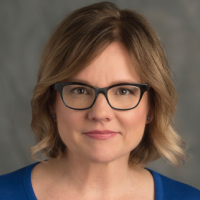
Connecticut’s Gayathri Vijayakumar Receives National Leadership in Sustainability and Energy Efficiency Award
Gayathri Vijayakumar was selected for her dedication to establishing consensus in the development of the 2024 International Energy Conservation Code.
The International Code Council presented the National Leadership in Sustainability and Energy Efficiency Award to Gayathri Vijayakumar during the U.S. Department of Energy’s 2023 National Energy Codes Conference in Chicago on May 3, 2023. The award recognizes outstanding contributions to the growth and enhancement of International Codes® (I-Codes) and/or public policy by advocating for the principles of the Code Council’s Sustainability Membership Council.
Gayathri Vijayakumar, Principal Mechanical Engineer at Steven Winter Associates, Inc. (SWA) in Connecticut, was selected for her dedication to establishing consensus in the development of the 2024 International Energy Conservation Code® (IECC), which ultimately will help achieve global net-zero energy and decarbonization goals.
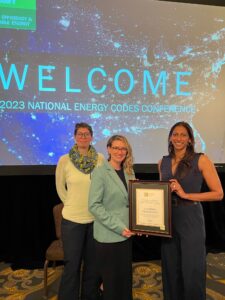
For over 17 years, Vijayakumar has been an energy conservation advocate specializing in evaluating residential and multi-family buildings with an emphasis on high-performance, energy-efficient construction and renewable energy systems.
“I am honored to receive this award, but there’s also a part of me that feels like it was more of a team effort,” said Vijayakumar. “I may have been the catalyst or mediator for certain conversations, but I worked alongside many code change proponents and committee members to accomplish these 2024 IECC revisions.”
Like many in the building industry, Vijayakumar is passionate about helping residential buildings achieve decarbonization, which includes reducing and/or capturing fossil fuel emissions, plus changing the energy economy overall. She is also quite concerned about the negative impact that humans have on the environment.
“I do what I do to help slow this increasing crisis in the hopes that our planet remains livable for generations to come,” she said. “Having two kids motivates me because I don’t want them to experience what is predicted if we don’t do something to combat climate change.”
She hopes that the industry will produce a net-zero energy/carbon code by 2030.
Vijayakumar’s Foray into the Building Safety Industry
After graduating from Penn State with an engineering science degree in 2000, Vijayakumar knew that she wanted a career that made a positive impact on the world. So, she volunteered as a Peace Corps volunteer educator for two years.
She later earned a master’s degree in mechanical engineering with a solar energy focus, as well as a certificate in energy analysis and policy. Her father, who is a mechanical engineer, recommended that she consider Steven Winter Associates, Inc. and its focus on high-performance buildings. She joined the firm in 2005 and is currently on the company’s Diversity, Equity and Inclusion Council.
She credits SWA’s former president Dianne Griffiths for supporting her path into codes and standards development. “I would have never realized the impact I could have in this part of the building industry without her mentorship,” Vijayakumar said.

Consensus-Building to Support a Sustainable Future
As a member of the IECC Residential Consensus Committee, Vijayakumar’s integrity and professionalism were instrumental in establishing group consensus and finding a middle ground among diverse interests and perspectives. She was deeply involved in assisting multiple sub-committees by contacting proponents and organizing agendas. In addition, she spearheaded various working groups to update the 2024 I-Codes.
Vijayakumar’s firsthand knowledge helped her with developing and providing technical support to the EPA’s ENERGY STAR multifamily high-rise and new construction programs. Her work with various constituents to develop and refine program requirements that are efficient, frugal and feasible led her to code and standard development activities. She believed that her colleagues’ work would be more impactful to the built environment if their discoveries could be applied to a greater number of buildings.
In addition to the EPA’s multi-family new construction program, Vijayakumar also provides technical support for the Indoor airPLUS program, a voluntary labeling and home builder partnership program to improve air quality inside new structures.
This clean air initiative requires construction practices and product specifications that minimize exposure to airborne contaminants and pollutants, crucial to everyone but vital to those with respiratory conditions. In that capacity, Vijayakumar supports the EPA to develop new programs, revise requirements, deliver training and answer participant questions.
For her 2024 IECC work, Vijayakumar attends main and sub-committee meetings, drafts and reads proposals before voting, then coordinates with proponents and opponents to make code change revisions.
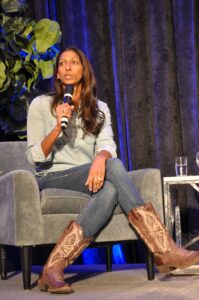
As chair of the Residential Energy Services Network Standards Development Committee (SDC 3000), Vijayakumar oversees and works with other voting members to amend RESNET’s technical standards for inspections, testing and calculations. She’s an American Society of Heating, Refrigerating and Air-Conditioning Engineers (ASHRAE) Building Energy Modeling professional, too.
“In code development, success comes from persistence,” Vijayakumar said. “We need to be patient and communicate effectively. We have to have thick skin and be genuinely open to hearing opposing viewpoints. As building science consultants, we must be passionate about reducing the built environment’s impact on the natural world.”
Embracing the Code Development Process
Vijayakumar first started working with the Code Council in 2016 during the IECC Conference in Kansas City. For the 2024 IECC, she summarized the proposed requirements for residential buildings, including an overview of the consensus development process.
In October 2021, about 200 code-change proposals were submitted for consideration and were then assigned to one of five residential sub-committees: envelope, HVAC, existing buildings, modeling, electrical and renewables. During Spring 2022, the committee voted in online meetings for the 200-plus proposals. A simple majority didn’t support about 100 of those, so they were “disapproved.” The remaining 100 were voted on, needing a two-thirds majority to pass.
Only 16 proposals failed that vote because although they contained significant decarbonization improvements like electric- and solar-readiness and EV infrastructure, they also had elements that would require significant revisions to gain needed votes. Committee members were then invited to meet informally to find compromises rather than letting those proposals fail entirely.
See Related: Exploring Ways to Get Involved in the Code Development Process
The first draft of the IECC-R (residential) won’t include a ban of fossil fuel use or mandates for electric charging stations in new residential construction projects, Vijayakumar said. But developing a “glide path” to zero energy by 2030 has been given to the Residential Consensus Committee. A points-based system has also been proposed to provide more opportunities to achieve additional efficiency. More realistic targets have been provided for the Energy Rating Index path as well.
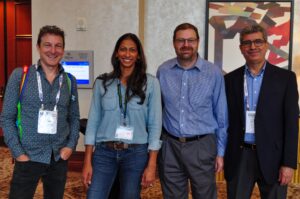
In addition to the solar and electric/EV readiness plans, the four areas of readiness for “getting to zero” also include demand-response capable water heating, adding slab insulation, increasing window performance, reducing envelope air leakage thresholds and allowing sampling of air and duct leakage testing in multifamily buildings.
Vijayakumar encourages building code professionals to participate in the public comment process before Friday, June 30, 2023.
An Immersive Education and An Electric Future for Building Industry Professionals
Vijayakumar is excited to participate in the building industry’s rapid changes.
“Early in my career, the focus was on getting out of oil fuels and into natural gas,” she remembered. “We didn’t ever talk about electrifying everything. But now, we’re moving toward reconsidering the benefits of unitized systems and switching to all-electric as better long-term environmental choices.”
She also has advice for future building industry professionals.
“If you’re getting a degree in architecture or engineering, remember to balance academic work with boots-on-the-ground internships that complement your potential future work, like with a builder or construction company,” she said.
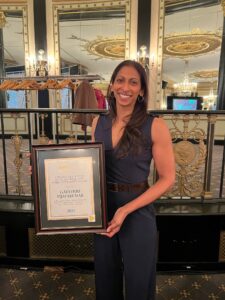
Learn more about the National Leadership in Sustainability and Energy Efficiency Award, here.
Find a Code Council code committee volunteer opportunity, here.
